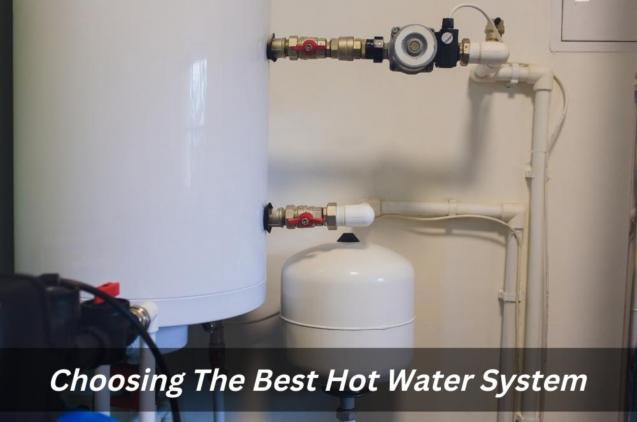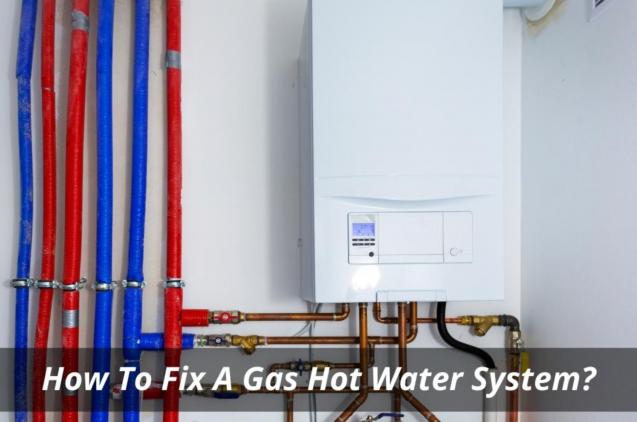
What Are The Signs Of A Failing Hot Water Heater?
By Sydney Hot Water Systems|March 16, 2023
A failing hot water heater is a problem no homeowner wants to confront. The lack of hot water can be a major inconvenience, and if the issue is not addressed quickly, it can lead to more costly repair bills. Fortunately, there are warning signs that can help you identify when your water heater needs attention.
If you experience a lack of hot water or low temperatures when running your showers, this could be an indication that your water heater is malfunctioning. You may also notice rusty water coming out of the tap or sediment buildup at the bottom of the water heater tank.
Other signs that indicate a failing hot water heater include mineral deposits on heating elements and corroded anode rods. If you hear unusual noises coming from your unit, such as rumbling or popping noises, it could also be an indication of trouble.
If you suspect your hot water heater may be failing, it's best to have it checked by a professional right away. They will be able to assess the situation and advise you on whether you should replace or repair your unit. Consider switching to an energy-efficient heat pump or tankless water heater for increased savings and performance over time.
Strange Noises Coming from the Tank
Strange noises coming from your hot water tank can be a sign of a failing unit. If you notice unusual rumbling, popping or hissing sounds coming from your water heater, it could be an indication that something is wrong with the unit. This could be caused by a variety of issues, including sediment buildup in the bottom of the tank, rust on the heating elements or mineral deposits on anode rods. The noise could also indicate that there is an issue with the gas lines or electrical wiring.
If you suspect that strange noises are coming from your hot water heater, it's best to have it checked out by a professional as soon as possible. They will be able to assess the situation and advise you if any repair or replacement work needs to be done. If your unit is beyond repair, then consider switching to a more efficient heat pump or tankless system for improved efficiency and long-term savings.
Decrease in Hot Water Supply
If you're noticing a decrease in the amount of hot water that your unit is supplying, it may be a sign of a failing hot water heater. This could indicate sediment buildup or mineral deposits on the heating element and anode rods, which can reduce the efficiency of your unit and cause it to produce less hot water. It's also possible that there's a problem with the gas lines, electrical wiring, or with the thermostat setting.
If you think that the decrease in hot water supply could be related to an issue with your unit, then it's best to have it checked out by a professional as soon as possible. They can assess the situation and advise you if any repair or replacement work needs to be done. If your current system is beyond repair, then consider switching to an energy-efficient heat pump or tankless system for improved efficiency and long-term savings.
Hot Water Tank Leaking
Leaks from your hot water tank can be a sign of a failing unit and should not be ignored. If you notice any signs of water leakage, it’s important to have the system checked by a professional. Leaks can occur due to corroded or cracked tanks, corrosion on the pipes, or if your anode rods are not functioning properly. These issues could lead to further damage, so it’s best to address them right away.
If the problem is simply wear-and-tear, then replacing the faulty part may be enough to fix the issue. However, if there is more significant damage present, such as rusting at the bottom of the tank or sediment buildup that is preventing proper water heating, then you may need to replace your water heater. This could be worth considering if you're looking for greater energy efficiency with continuous flow systems such as solar hot water systems or heat pumps.
No matter what type of hot water system you have installed in your home, it's important to keep an eye out for any warning signs of failure and take action swiftly if necessary. By doing this you can ensure that you don't end up with costly repairs and replace your system when needed for a reliable source of hot water all year round.
Discoloured or Smelly Water
Discoloured or smelly water coming from your taps can be a sign of a failing hot water system. This is often caused by mineral deposits that have built up on the tank, sediment buildup, or corrosion on the pipes. These issues can cause rust-coloured water and unpleasant odours, as well as reduce the efficiency of your hot water heater.
If you notice any signs of discolouration or bad smells coming from your taps, it’s important to take action right away. You should contact a professional to inspect your water heater and determine what needs to be done in order to remedy the issue. In some cases, replacing certain parts such as anode rods or heating elements may be enough to solve the problem. However, if there is more serious damage present then you may need to replace your entire hot water tank.
No matter what type of system you have installed in your home, it’s important to keep an eye out for any warning signs of water heater failure and take action swiftly if necessary. By doing this you can ensure that you remain safe and enjoy reliable access to hot water all year round.
Water Pressure Issues
Water pressure problems can be a sign of a failing hot water system. If you start to notice that your taps are not providing enough hot water, or the flow from them is significantly reduced, then it could indicate that your system is failing. This issue may be caused by mineral deposits building up inside the tank or pipes, sediment buildup, corrosion on the pipes, or a blockage in the valves. It can also be caused by leaks in the pipes leading to and from the tank.
It’s important to get any issues with water pressure checked out right away as this could be a sign of more serious damage occurring within your hot water system. A professional plumber should be able to inspect your tank and identify what needs to be done in order to restore adequate water pressure.
Depending on the extent of the problem they may recommend replacing parts such as anode rods or heating elements or even suggest replacing your entire hot water heater with a more energy-efficient model such as a heat pump or tankless system.
Prevention Strategies for Hot Water Heaters
Preventative maintenance is the best way to ensure your hot water heater remains in good working order. Regularly check for signs of wear and tear, such as rust or sediment buildup on the bottom of the tank. If you see any, it's important to address them right away in order to avoid further damage.
You should also inspect pipes leading to and from the tank frequently for blockages or corrosion, and replace any faulty valves. If you have a continuous flow system installed in your home, then it’s important that you get it serviced annually by a professional plumber in order to keep it running at its peak efficiency.
For those with solar hot water systems, make sure that all components are regularly cleaned and inspected for any signs of damage or wear and tear. This will help prevent the system from failing prematurely and ensure you get maximum efficiency out of it for years to come.
Finally, if you have an older model hot water heater then consider replacing it with a more energy-efficient one like a heat pump or tankless system. These can save you money on your energy bills while ensuring that your home has reliable access to hot water whenever needed.
Regular Maintenance and Inspection
Regular maintenance and inspection of your hot water heater are necessary to ensure it remains in good working order. Inspect the tank for rust or sediment buildup on the bottom, as well as any blockages or corrosion on pipes leading to and from the tank. Replacing faulty valves can help prevent further damage and keep your heating system running efficiently.
If you have a continuous flow system installed, call a hot water service plumber annually. Solar hot water systems should be regularly cleaned and inspected for signs of damage or wear and tear.
Finally, if you have an older model hot water heater, consider replacing it with a more energy efficient one such as a heat pump or tankless system. Proper maintenance and inspection of your hot water heater will save you money on energy bills while ensuring reliable access to hot water when needed.
If you experience a lack of hot water or low temperatures when running your showers, this could be an indication that your water heater is malfunctioning. You may also notice rusty water coming out of the tap or sediment buildup at the bottom of the water heater tank.
Other signs that indicate a failing hot water heater include mineral deposits on heating elements and corroded anode rods. If you hear unusual noises coming from your unit, such as rumbling or popping noises, it could also be an indication of trouble.
If you suspect your hot water heater may be failing, it's best to have it checked by a professional right away. They will be able to assess the situation and advise you on whether you should replace or repair your unit. Consider switching to an energy-efficient heat pump or tankless water heater for increased savings and performance over time.
Strange Noises Coming from the Tank
Strange noises coming from your hot water tank can be a sign of a failing unit. If you notice unusual rumbling, popping or hissing sounds coming from your water heater, it could be an indication that something is wrong with the unit. This could be caused by a variety of issues, including sediment buildup in the bottom of the tank, rust on the heating elements or mineral deposits on anode rods. The noise could also indicate that there is an issue with the gas lines or electrical wiring.
If you suspect that strange noises are coming from your hot water heater, it's best to have it checked out by a professional as soon as possible. They will be able to assess the situation and advise you if any repair or replacement work needs to be done. If your unit is beyond repair, then consider switching to a more efficient heat pump or tankless system for improved efficiency and long-term savings.
Decrease in Hot Water Supply
If you're noticing a decrease in the amount of hot water that your unit is supplying, it may be a sign of a failing hot water heater. This could indicate sediment buildup or mineral deposits on the heating element and anode rods, which can reduce the efficiency of your unit and cause it to produce less hot water. It's also possible that there's a problem with the gas lines, electrical wiring, or with the thermostat setting.
If you think that the decrease in hot water supply could be related to an issue with your unit, then it's best to have it checked out by a professional as soon as possible. They can assess the situation and advise you if any repair or replacement work needs to be done. If your current system is beyond repair, then consider switching to an energy-efficient heat pump or tankless system for improved efficiency and long-term savings.
Hot Water Tank Leaking
Leaks from your hot water tank can be a sign of a failing unit and should not be ignored. If you notice any signs of water leakage, it’s important to have the system checked by a professional. Leaks can occur due to corroded or cracked tanks, corrosion on the pipes, or if your anode rods are not functioning properly. These issues could lead to further damage, so it’s best to address them right away.
If the problem is simply wear-and-tear, then replacing the faulty part may be enough to fix the issue. However, if there is more significant damage present, such as rusting at the bottom of the tank or sediment buildup that is preventing proper water heating, then you may need to replace your water heater. This could be worth considering if you're looking for greater energy efficiency with continuous flow systems such as solar hot water systems or heat pumps.
No matter what type of hot water system you have installed in your home, it's important to keep an eye out for any warning signs of failure and take action swiftly if necessary. By doing this you can ensure that you don't end up with costly repairs and replace your system when needed for a reliable source of hot water all year round.
Discoloured or Smelly Water
Discoloured or smelly water coming from your taps can be a sign of a failing hot water system. This is often caused by mineral deposits that have built up on the tank, sediment buildup, or corrosion on the pipes. These issues can cause rust-coloured water and unpleasant odours, as well as reduce the efficiency of your hot water heater.
If you notice any signs of discolouration or bad smells coming from your taps, it’s important to take action right away. You should contact a professional to inspect your water heater and determine what needs to be done in order to remedy the issue. In some cases, replacing certain parts such as anode rods or heating elements may be enough to solve the problem. However, if there is more serious damage present then you may need to replace your entire hot water tank.
No matter what type of system you have installed in your home, it’s important to keep an eye out for any warning signs of water heater failure and take action swiftly if necessary. By doing this you can ensure that you remain safe and enjoy reliable access to hot water all year round.
Water Pressure Issues
Water pressure problems can be a sign of a failing hot water system. If you start to notice that your taps are not providing enough hot water, or the flow from them is significantly reduced, then it could indicate that your system is failing. This issue may be caused by mineral deposits building up inside the tank or pipes, sediment buildup, corrosion on the pipes, or a blockage in the valves. It can also be caused by leaks in the pipes leading to and from the tank.
It’s important to get any issues with water pressure checked out right away as this could be a sign of more serious damage occurring within your hot water system. A professional plumber should be able to inspect your tank and identify what needs to be done in order to restore adequate water pressure.
Depending on the extent of the problem they may recommend replacing parts such as anode rods or heating elements or even suggest replacing your entire hot water heater with a more energy-efficient model such as a heat pump or tankless system.
Prevention Strategies for Hot Water Heaters
Preventative maintenance is the best way to ensure your hot water heater remains in good working order. Regularly check for signs of wear and tear, such as rust or sediment buildup on the bottom of the tank. If you see any, it's important to address them right away in order to avoid further damage.
You should also inspect pipes leading to and from the tank frequently for blockages or corrosion, and replace any faulty valves. If you have a continuous flow system installed in your home, then it’s important that you get it serviced annually by a professional plumber in order to keep it running at its peak efficiency.
For those with solar hot water systems, make sure that all components are regularly cleaned and inspected for any signs of damage or wear and tear. This will help prevent the system from failing prematurely and ensure you get maximum efficiency out of it for years to come.
Finally, if you have an older model hot water heater then consider replacing it with a more energy-efficient one like a heat pump or tankless system. These can save you money on your energy bills while ensuring that your home has reliable access to hot water whenever needed.
Regular Maintenance and Inspection
Regular maintenance and inspection of your hot water heater are necessary to ensure it remains in good working order. Inspect the tank for rust or sediment buildup on the bottom, as well as any blockages or corrosion on pipes leading to and from the tank. Replacing faulty valves can help prevent further damage and keep your heating system running efficiently.
If you have a continuous flow system installed, call a hot water service plumber annually. Solar hot water systems should be regularly cleaned and inspected for signs of damage or wear and tear.
Finally, if you have an older model hot water heater, consider replacing it with a more energy efficient one such as a heat pump or tankless system. Proper maintenance and inspection of your hot water heater will save you money on energy bills while ensuring reliable access to hot water when needed.



